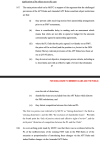Perhaps it's easier to break it down into what I know and what I think.
Here's what I know:
(a) the Premier League has no unilateral power to change the rules without giving due notice of any proposed rule change and receiving the support of a 2/3 of the clubs present and voting. So a behind the scenes rule change has simply not happened. It would be as unlawful as the original APT rules.
(b) The joint statement confirms that the entire dispute between the club and the league has been settled. Since as well as APT 2 there were also outstanding issues from APT 1 concerning the costs of the two hearings (which will run to tens of millions), compensation and even injunctive relief, it follows that all these elements have been settled also.
(c) City had something of a slam-dunk case for costs arising from APT 1. They would be unlikely however to recover less than about 60% and more than about 80% of their total outlay. So there was an area of doubt as to the exact figure, but the broad parameters of what they were going to recover were known.
(d) City had a solid claim for damages if they could show there was a loss which flowed from sponsorship deals being thwarted by unlawful rules. But the precise measure of their loss depends on what happened afterwards, which we don't know.
(e) City had probably no realistic chance (nor even any reason) to seek any sort of injunction.
(f) City have plainly got some ongoing deal with Etihad, because their name is still being printed on the front of the shirt. What we don't know is on what basis that ongoing sponsorship has been agreed.
(g) Compensation works by replacing what you should have had if the wrongful act had not been done. So if you haven't lost out, there is no right to compensation even if someone has done something unlawful.
Okay, now on to what I think,
(a) City won't have known specifically how much they would recover towards their costs, but as I say would have had a pretty good idea. So a compromise that included a figure of £X for costs probably doesn't give City anything that they wouldn't have got anyway.
(b) Much the same point can be made in relation to damages. If the Etihad deal passes as originally agreed, what loss have City actually incurred? Likewise, if the press rumours are bollocks and City will only be able to be sponsored up to the tune of £X by Etihad, and not £Y, they have a fairly easily quantifiable claim for damages by being prevented from entering into a deal by the application of unlawful rules. Again, we don't quite know what the loss City have suffered in relation to not just the Etihad deal but also (say) the First Abu Dhabi Bank deal being rejected, but it will not be difficult to work out.
(c) I can't see any legal or commercial reason why we would have settled the APT 2 case for the sorts of things - costs and damages - that we were going to get anyway. It seems to me that there has to be something tangible which the PL was (a) able to offer, and (b) did offer.
(d) Whilst from City's perspective there might not be too much difference between getting the full value of the Etihad deal from Etihad, and getting a lower deal approved plus damages from the PL, from the PL's perspective, there is a huge difference between the two. Using the future growth issue as an illustration, if we had agree 6% future growth with Etihad and the PL said "you can't have more than 5%" over the 10 year lifetime of a £1.5bn deal that adds up to quite a lot.
Which, if the Etihad deal was wrongfully impeded, the PL was on the hook for.
Which seems to give them quite an incentive in terms of agreeing a settlement that doesn't block the Etihad deal.
From City's perspective, they would much rather have the certainty of the deal with Etihad proceeding without further hiccup, and from the PL's perspective they would sooner not be on the hook for a substantial damages claim. (I think that in relation to some other aspects of the claim, eg the delays in the FMV assessments, they are on the hook anyway but those will be for much more manageable sums.)
We don't know, but what I think is that City had the PL between a rock and a hard place. I simply can't imagine why we would have settled all the aspects of the deal if it wasn't overall something we were satisfied with. It certainly wasn't some undisclosed rule change, and a promise by the PL to apply their rules fairly in the future is scarcely worth the paper it's written on. They were under an obligation to do that anyway, and City failed to prove that they hadn't done so.
Trust the club. This is a win even if its not immediately obvious what the win actually was.


